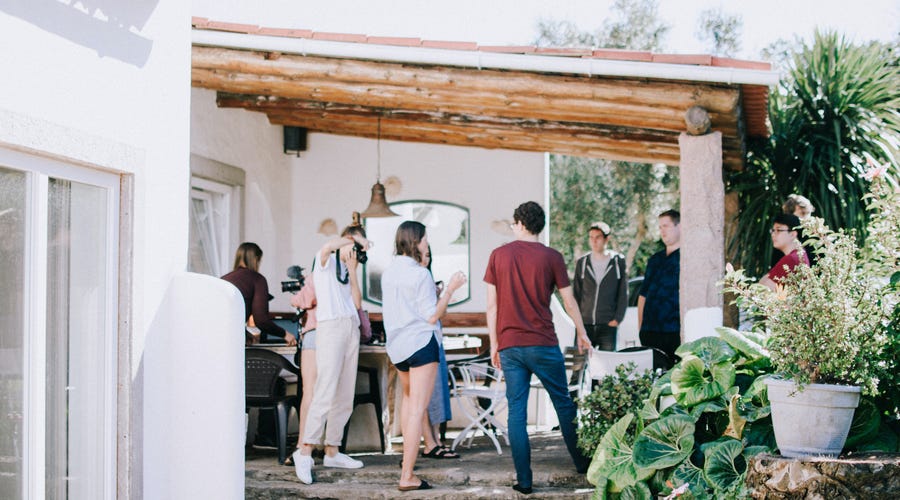
Learn to talk about your immediate, extended or chosen family in German
Author: Marie Schmoll
More than 40 million Americans claim German ancestry, so many of them feel a little bit German even if they don’t actually live in a German-speaking country. If that’s you and you want to explain in German that your great-great-grandfather came from Germany, we’ve got you covered.
Learning how to refer to family members in German is a great way to get started on learning the German language. These are usually some of the very first words we learned to say in our mother tongue, too. That’s why they’re so simple and easy to pronounce. After all, little German babies are just as new to the language as you are. If they can manage to say “Mom” and “Dad” in German, so can you!
Family in German
The German word for family is “Familie” [faˈmiːli̯ə] and the plural is “Familien” [faˈmiːli̯ən]. Luckily it’s very similar to the English word: Fah-me-lee-eh(/en).
Slang words include “deine Alten” (your old ones) for someone’s parents, but this expression has a negative connotation. So unless you’re joking with a friend, be polite and stick to the official terms when you encounter the following scenarios:
- When meeting your German friend’s or partner’s family
- When making German smalltalk by asking someone how their family has been
- When meeting someone new and asking them basic questions about their family situation in German
Interested in your family history?
Immediate family members in German
In German, the immediate family is called the “Kernfamilie” (nuclear or core family). Learning how to describe it is important for basic conversations. That’s why we’ll teach you crucial words like “Mother”, “Father”, “Brother”, “Sister”, “Daughter” and “Son” in German.

| English | German | IPA |
|---|---|---|
| Mother | Mutter | [ˈmʊtɐ] |
| Mom | Mama | [ˈmama] |
| Mommy | Mami | [ˈmami] |
| Father | Vater | [ˈfaːtɐ] |
| Dad | Papa | [ˈpapa] |
| Pop | Papi, Paps | [ˈpapi, paps] |
| Parents | Eltern | [ˈɛltɐn] |
| Siblings | Geschwister | [ɡəˈʃvɪstɐ] |
| Brother | Bruder | [ˈbʁuːdɐ] |
| Sister | Schwester | [ˈʃvɛstɐ] |
| Son | Sohn | [zoːn] |
| Daughter | Tochter | [ˈtɔxtɐ] |
| Wife | (Ehe-)frau | [ˈeːəˌfʁaʊ̯] |
| Husband | (Ehe-)mann | [ˈeːəˌman] |
Extended family in German
Of course, most families are bigger than that. You might want to talk about your third cousins and your great great grandmother in German, too.

| English | German | IPA |
|---|---|---|
| Grandmother | Großmutter | [ˈɡʁoːsˌmʊtɐ] |
| Grandma | Oma | [ˈoːma] |
| Grandfather | Großvater | [ˈɡʁoːsˌfaːtɐ] |
| Grandpa | Opa | [ˈoːpa] |
| Grandparents | Großeltern | [ˈɡʁoːsˌʔɛltɐn] |
| Female cousin | Cousine | [kuˈziːnə] |
| Male cousin | Cousin | [kuˈzɛ̃ː] |
| Aunt | Tante | [ˈtantə] |
| Uncle | Onkel | [ˈɔŋkl̩] |
| Niece | Nichte | [ˈnɪçtə] |
| Nephew | Neffe | [ˈnɛfə] |
| Great-grandparents | Ur-Großeltern | [uːɐ̯ˈɡʁoːsˌʔɛltɐn] |
| Great-grandmother | Ur-Großmutter | [uːɐ̯ˈɡʁoːs ˈmʊtɐ] |
| Great-grandfather | Ur-Großvater | [uːɐ̯ˈɡʁoːsˌ ˈfaːtɐ] |
| Great-Aunt | Urgroßtante | [uːɐ̯ˈɡʁoːsˌ ˈtantə] |
| Great-Uncle | Urgroßonkel | [uːɐ̯ˈɡʁoːsˌ ˈɔŋkl̩] |
| Great-great-grandmother | Ururgroßmutter | [ˈuːɐ̯ʔuːɐ̯ʔuːɐ̯ɡʁoːsˈmʊtɐ] |
| Great-great-grandfather | Ururgroßvater | [ˈuːɐ̯ʔuːɐ̯ʔuːɐ̯ɡʁoːsˌfaːtɐ] |
Family members by marriage - Step and in-laws
In Germany, like in America, too, the inlaws have a worse image than they deserve. Even though most people actually do get along with their in-laws, one German expression in particular reflects on the bad rep they get: “Jemanden stiefmütterlich behandeln” (to treat someone stepmotherly) means “to neglect or ignore someone”.
| English | German Singular | IPA |
|---|---|---|
| Stepmom | Stiefmutter | [ˈʃtiːfˌmʊtɐ] |
| Stepdad | Stiefvater | [ˈʃtiːfˌfaːtɐ] |
| Step-sister | Stiefschwester | [ˈʃtiːfˌʃvɛstɐ] |
| Step-brother | Stiefbruder | [ˈʃtiːfˌbʁuːdɐ] |
| Parents-in-law | Schwiegereltern | [ˈʃviːɡɐˌʔɛltɐn] |
| Mother-in-law | Schwiegermutter | [ˈʃviːɡɐˌmʊtɐ] |
| Father-in-law | Schwiegervater | [ˈʃviːɡɐˌfaːtɐ] |
| Daughter-in-law | Schwiegertochter | [ˈʃviːɡɐˌtɔxtɐ] |
| Son-in-law | Schwiegersohn | [ˈʃviːɡɐˌzoːn] |
Other family-related terms in German
Family is based on so much more than biology. Here are some important terms you can use to explain and introduce your chosen family including adoption and marriage.

| English | German | IPA |
|---|---|---|
| Adopted | Adoptiert | [adɔpˈtiːɐ̯t] |
| Surrogate | Leihmutter | [ˈlaɪ̯mʊtɐ] |
| Twins | Zwillinge | [ˈt͡svɪlɪŋə] |
| Triplets | Drillinge | [ˈdʁɪlɪŋə] |
| Quadruplets | Vierlinge | [ˈfiːɐlɪŋə] |
| Male spouse | Gatte | [ˈɡatə] |
| Female spouse | Gattin | [ˈɡatɪn] |
| Male partner | Partner | [ˈpaʁtnɐ] |
| Female partner | Partnerin | [ˈpaʁtnəʁɪn] |
| De facto partner | Lebenspartner | [ˈleːbn̩sˌpaʁtnɐ] |
| In love | Verliebt | [fɛɐ̯ˈliːpt] |
| Engaged | Verlobt | [fɛɐ̯ˈloːpt] |
| Married | Verheiratet | [fɛɐ̯ˈhaɪ̯ʁaːtət] |
| Separated | Getrennt | [ɡəˈtʁɛnt] |
| Divorced | Geschieden | [ɡəˈʃiːdn̩] |
| Widow | Witwe | [ˈvɪtvə] |
| Foster mom | Pflegemutter | [ˈp͡fleːɡəˌmʊtɐ] |
| Foster dad | Pflegevater | [ˈp͡fleːɡəˌfaːtɐ] |
| Foster child | Pflegekind | [ˈp͡fleːɡəˌkɪnt] |
| Godmother | Patentante | [ˈpaːtn̩ˌtantə] |
| Godfather | Patenonkel | [ˈpaːtn̩ˌʔɔŋkl̩] |
| Godson | Patensohn | [ˈpaːtn̩ˌkɪnt] |
| Goddaughter | Patentochter | [ˈpaːtn̩ˈtɔxtɐ] |
| Baby | Baby | [ˈbeːbi] |
| Toddler | Kleinkind | [ˈklaɪ̯nˌkɪnt] |
| Tween | Tween | [ˈtwiːn] |
| Teenager | Teenager | [ˈtiːnʔɛɪ̯d͡ʒɐ] |
| Youth | Jugendlicher / Jugendliche | [ˈjuːɡəntlɪçɐ / ˈjuːɡn̩tlɪçə] |
| Adult | Erwachsener / Erwachsene | [ɛɐ̯ˈvaksənɐ / ɛɐ̯ˈvaksənə] |
| Relative | Verwandter / Verwandte | [fɛɐ̯ˈvantɐ / fɛɐ̯ˈvantə] |
| Ancestors | Vorfahren | [ˈfoːɐ̯ˌfaːʁən] |
| Generation | Generation | [ɡenəʁaˈt͡si̯oːn] |
| Youngest child | Jüngstes Kind | [ˈjʏŋstəs kɪnt] |
| Middle child | Mittelkind | [ˈmɪtl̩kɪnt] |
| Eldest child | Ältestes Kind | [ˈɛltəstəs kɪnt] |
| Nuclear family | Kernfamilie | [ˈkɛʁnfaˌmiːli̯ə] |
| Small family | Kleinfamilie | [ˈklaɪ̯nfaˌmiːli̯ə] |
| Blended family | Patchwork-Familie | [ˈpɛt͡ʃvœʁkfaˌmiːli̯ə] |
Talking about family in day to day situations
When you meet someone new, the first thing you probably want to know is their name. Next up, asking about their family is a great way to get to know them a little bit. You might want to ask if they have siblings or children and chat about your own family situation. So we’ll get you started with the basics.

Common conversation
- Question. Hast du Geschwister?
(Do you have siblings?) - Answer. Ja, ich habe einen großen Bruder und zwei kleine Schwestern.
(Yes, I have a big brother and two little sisters.)
- Question. Hast du eine große Familie?
(Do you have a big family?) - Answer. Meine Familie besteht aus meinem Papa, meiner Stiefmama, meinem Bruder Bruno und meiner Katze Fräulein Miez.
(My family consists of my dad, my stepmom, my brother Bruno and my cat Fräulein Miez).
- Question. Leben deine Eltern in der Nähe?
(Do your parents live close by?) - Answer. Nein, meine Eltern leben beide in Hamburg und ich lebe in Frankfurt.
(No, my parents both live in Hamburg and I live in Frankfurt.)
Age
An easy follow-up question is to ask their sibling’s age (or their puppy’s!). Remember pets absolutely are a part of the family. So don’t forget to incorporate them in the conversation. If you need help remembering what to call your pet in German, refer to our fun guides on animals and birds in German.
- Question. Ist deine Schwester älter oder jünger als du?
(Is your sister older or younger than you?) - Answer. Meine Schwester ist zwei Jahre jünger als ich.
(My sister is two years younger than me.)
- Question. Wie alt sind deine Geschwister?
(How old are your siblings?) - Answer. Mein kleiner Bruder ist erst 10. Er geht noch zur Schule. Mein anderer Bruder studiert.
(My little brother is only 10. He is still in school. My other brother is in college).
- Question. Wie alt sind deine Haustiere?
(How old are your pets?) - Answer. Mein Welpe ist erst ein Jahr alt, und mein Papagei ist zwei.
(My puppy is only one year old, and my parrot is two.)
Describing your family in German
Do you have your mom’s eyes but your dad’s ears? There are many things you can say about your family, all of them great for smalltalk.
- Meine Mutter und mein Vater haben braune Augen, wie ich, aber meine Schwester hat blaue Augen.
(My mother and father have brown eyes, like me, but my sister has blue eyes.) - Ich hab die schwarzen Locken von meinem Vater. Meine Mutter hat rote Haare.
(I got my curly black hair from my dad. My mother has red hair.)
- Ich bin mit einem Zwilling verheiratet.
(I’m married to a twin.) - Ich bin adoptiert.
(I’m adopted.)
- Ich telefoniere einmal im Monat mit meinen Eltern.
(I call my parents once a month.) - Ich bin ein Katzenmensch, aber mein Freund ist eher ein Hundemensch.
(I’m a cat person but my boyfriend is more of a dog person.)
Family-related German idioms
There are some fun idioms and sayings about family members in German. To raise someone literally means “to pull someone tall” (großziehen), which, as so many other quirky German expressions, creates a wonderful picture - like you could just grab the child by the head and the feet and start pulling them until they’re tall.
Also, having custody over a child is “the right to worry about them” (Sorgerecht) and the big toe is called the “Big uncle” in German (Großer Onkel).
| German | IPA | Literal Translation | Meaning |
|---|---|---|---|
| Großziehen | [ˈɡʁoːsˌt͡siːən] | To pull big | To raise |
| Sorgerecht | [ˈzɔʁɡəˌʁɛçt] | The right to worry | Custody |
| Spielkind | [ʃpiːlkaɪnd] | Playchild | Someone who likes to play around |
| Wir werden das Kind schon schaukeln | [vi:ɐ̯ ˈvɛʁdn̩ das kɪnt ʃo:n ˈʃaʊ̯kl̩n] | We’re gonna rock the child | We got this |
| In den Schoß der Familie zurückkehren | [ɪn de:n ʃɔs de:ɐ̯ fami:ljə t͡su:ʁʏkke:ʁən] | To return to the lap of the family | To return to the fold |
| Sich ins gemachte Nest setzen | [zɪç ɪns gəmaxtə nɛst zɛt͡sən] | To sit down in the nest that’s already made | To benefit from other people’s work |
| Rabenmutter | [ˈʁaːbm̩ˈmʊtɐ] | Raven-mother | Heartless mother |
| Das schwarze Schaf | [das ˈʃvaʁt͡sə ʃaːf] | The black sheep | The odd one in the family |
| Nicht von schlechten Eltern | [nɪçt fɔn ʃlɛçtn̩ ˈɛltɐn] | Not from bad parents | Good quality |
| Der große Onkel | [deːɐ̯ ˈɡʁoːsəˈɔŋkl̩] | The big uncle | The big toe |
| Tante-Emma-Laden | [tantəˈʔɛmaˌlaːdn̩] | Aunt-Emma-Shop | Corner store |
| Wurdest du als Kind zu heiß gebadet? | [ˈvʊʁdəst du: als kɪnt t͡su: haɪ̯s ɡəˈbaːdət] | Have you been bathed too hot as a child? | Have you been dropped on your head? |
| Das Kind beim Namen nennen | [das ˈkɪnt baɪ̯m ˈnaːmən ˈnɛnən] | To call the child by its name | To call a spade a spade |
| Mit Kind und Kegel | [[mɪt ˌkɪnt⁀ʊn(t) ˈkeːɡl̩]] | With child and cone | With the whole family (“cone” being an archaic term for an extramarital child) |
| Liebkind | [ˈliːpˌkɪnt] | Lovelychild | Everybody’s darling (especially Austrian) |
| Das Kind mit dem Bade ausschütten | [das kɪnt mɪt deːm ˈbaːdə ˈaʊ̯sʃʏtn̩] | To throw the child out with the bathwater | To take far too drastic measures |
| Das Kind ist in den Brunnen gefallen | [das kɪnt ɪst ɪn de:n ˈbʁʊnən ɡəˈfalən] | The child has fallen into the well | It’s too late |
| Andere Mütter haben auch schöne Söhne / Töchter | [ˈandəʁə ˈmʏtɐ ˈhaːbn̩ aʊ̯x ˈʃøːnə ˈzøːnə / ˈtœçtɐ] | Other mothers have pretty sons / daughters, too | Don’t focus on this one person as your love interest |
Videos to learn how to talk about family in German
Kinderlieder - Die Hai-Familie
Have you always wanted to listen to the Baby Shark Song in German? Absolutely not?
Well, give it a try anyway because you know how effectively it will get stuck in your head. So when the lyrics are in German, you have no other choice but to learn them, including all the important family related words like “Mama”, “Papa”, “Oma” and “Opa”.
Cultural considerations when it comes to family in German
Marriages are at a record low in Germany - the lowest since World War I.
At the same time, birth rates have been increasing and people still form partnerships and live together. They just tend to not get married.
Maybe Germans are busy enough with the draining bureaucracies of everyday life and don’t want to make their lives even more complicated by adding the paperwork that comes with getting married to their list.
So they stay in committed relationships without getting married, which is how the beautifully long German word “Lebensabschnittsgefährte” came to be. A commonly used term, it literally translates to “life section companion” and refers to your current partner.
You may not want to use the word as a pet name, since it’s less romantic than “love of my life” and certainly longer than “bae” but if you think about it, it’s still a positive term.
It entails the idea that even if you may not spend your entire life with one person, they’re your companion for a specific time of your life and that’s very nice to have and acknowledge.
This is a very realistic, down-to-earth view on partnership - you might say a very German one.
Conclusion
Family structures hold societies together and they’re just as important in Germany as they are everywhere else. Yet, sometimes family matters can be a bit of a headache. So try to take an uncomplicated German approach to all things family:
If a relationship ever doesn’t work out, just thank your Lebensabschnittsgefährten that they were there for you during a special time in your life. Then remember that other mothers have pretty sons or daughters, too - and when it comes to raising kids, throw out all the parenting books. Just pull them until they’re tall enough to manage on their own.



